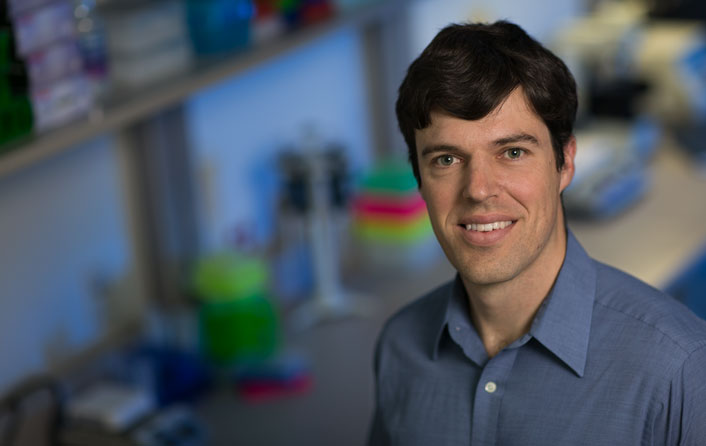
-
- Posted Monday April 27, 2020
TGen seeks volunteer patients for COVID-19 immunity study
A few drops of blood could reveal insights into how antibodies could stop this pandemic
FLAGSTAFF, Ariz. — April 27, 2020 — The Translational Genomics Research Institute (TGen), an affiliate of City of Hope, is looking for volunteers: individuals who have run the course of COVID-19, and whose immune system may have built up antibodies against this still mysterious disease.
Participants in The COVID Immunity Study must be U.S. residents, age 18 or older, have tested positive for COVID-19, and then recovered. They may sign up at: https://covidimmunity.org/.
This is a research study, and will not be used to diagnose disease among the participants. However, this study could eventually lead to new methods of diagnosing COVID-19, and help in the development of antibody therapies, and perhaps vaccines.
“We are using cutting-edge research tools to study, in depth, the immune response to COVID-19,” said Dr. John Altin, an Assistant Professor in TGen’s Pathogen and Microbiome Division, the institute’s infectious-disease branch in Flagstaff, also known as TGen North. “Our goal is to enable urgently-needed new diagnostics and treatments for this virus.”
Dr. David Engelthaler, Director of TGen North and Arizona’s former State Epidemiologist, said this “citizen-science” study could help researchers better understand how the virus has moved through our community.
“This will help us learn more about how, when and why we produce antibodies in response to a COVID-19 infection. One class of antibodies tackles the infection first, and then another comes in to finish the job,” Dr. Engelthaler said. “Knowing when these different immune responses occur, and how long they last, could help us understand if some patients gain a certain degree of immunity against reinfection. We need to know how that works.”
Dr. John Zaia, Director of the Center for Gene Therapy at City of Hope, is working on this study with TGen.
“Antibody testing will be critical very soon as we emerge from the COVID-19 pandemic, so this project is immensely important,” Zaia said. “To supplement this study, I am leading a research project at City of Hope, in collaboration with Dr. Altin’s lab, that will hopefully result in the development a COVID-19 virus antibody neutralization test. Together, these two tests will help us understand what is necessary for immune protection against COVID-19.”
Those who sign up for TGen’s study will be asked to complete a short online health questionnaire. TGen would then mail them a simple blood-spot collection kit. They would be instructed to prick the end of a finger and put a drop of blood on a sample collection card. A week later, they would put another drop of blood on the sample collection card, and then mail the test back to TGen.
TGen is hoping to initially recruit a few hundred volunteers to further understand the biological response to the SARS-CoV-2 virus, which causes the COVID-19 disease.
Dr. Altin said the goal is to produce an extremely robust view of the virus, one that could potentially show multiple ways the virus could be attacked, and at the same time differentiate between beneficial antibodies, and those that could prove to be harmful.
“It seems like almost every day there is a new antibody test for this virus. Overwhelmingly, the way these tests work is that they measure antibodies reactive against particular proteins of the virus,” Dr. Altin explained. “One of the things that they don’t necessarily do is to map which parts of those proteins are being targeted by the antibodies. Our approach will not only tell you which proteins are being targeted, but also be able to tell which regions of each protein are being targeted.”
Dr. Altin describes TGen’s approach as a high-resolution view of the antibody response, and how — by digging deeper —TGen hopes to uncover subtle differences that might be key to developing effective therapies, including the creation of genomic tools that might support vaccine development.
“Each protein can be recognized by many different types of antibodies,” Dr. Altin said. “By looking at this level of detail, we then could see elements of the antibody response that others might be missing.”
For more information, or to see if you qualify to participate, please visit https://covidimmunity.org/ or contact a TGen Clinical Research Coordinator at [email protected].
# # #
About TGen, an affiliate of City of Hope
Translational Genomics Research Institute (TGen) is a Phoenix, Arizona-based non-profit organization dedicated to conducting groundbreaking research with life-changing results. TGen is affiliated with City of Hope, a world-renowned independent research and treatment center for cancer, diabetes and other life-threatening diseases: www.cityofhope.org. This precision medicine affiliation enables both institutes to complement each other in research and patient care, with City of Hope providing a significant clinical setting to advance scientific discoveries made by TGen. TGen is focused on helping patients with neurological disorders, cancer, diabetes and infectious diseases through cutting-edge translational research (the process of rapidly moving research toward patient benefit). TGen physicians and scientists work to unravel the genetic components of both common and complex rare diseases in adults and children. Working with collaborators in the scientific and medical communities worldwide, TGen makes a substantial contribution to help our patients through efficiency and effectiveness of the translational process. For more information, visit: www.tgen.org. Follow TGen on Facebook, LinkedIn and Twitter @TGen.
Media Contact:
Steve Yozwiak
TGen Senior Science Writer
602-343-8704
[email protected]


